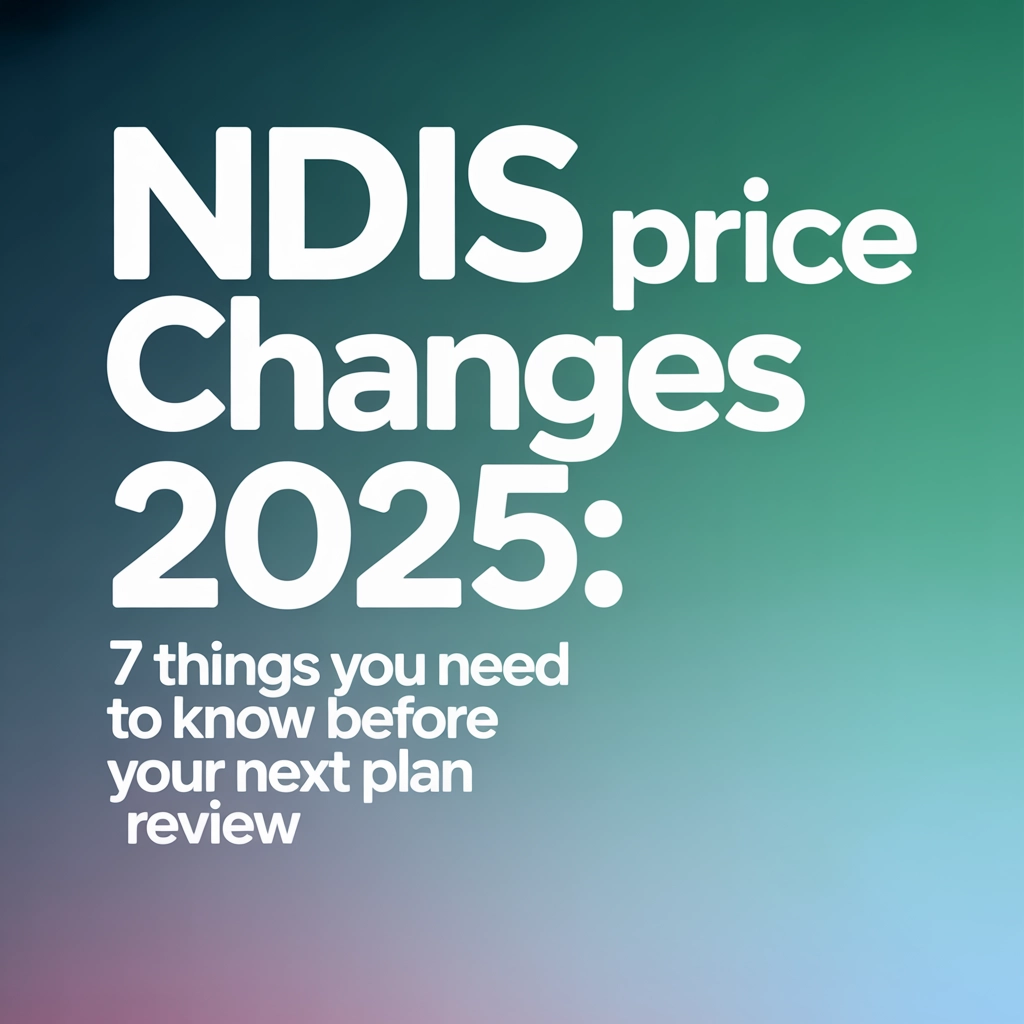NDIS Price Changes 2025: 7 Things You Need to Know Before Your Next Plan Review

The NDIS landscape is shifting, and 2025 brings some significant pricing changes that could impact your plan and the supports you access. Whether you're approaching your next plan review or just want to stay informed, understanding these changes will help you make better decisions about your NDIS journey.
Let's break down the seven key things you need to know about the 2025 NDIS price changes before your next plan review.
1. Your Plan Will Get Automatic Price Adjustments
Here's some good news – you won't need to stress about manually adjusting your plan for price changes. From mid-July 2025, the NDIA will automatically adjust your plan funding to reflect the new price limits.
Most NDIS supports are seeing a 4.36% indexation increase across the board. This adjustment reflects changes in both the Consumer Price Index and minimum wage rates, ensuring that support costs keep pace with the broader economy.
What does this mean for you? If you were previously hitting your budget limits, you might find you have a bit more breathing room. However, it's still worth reviewing your spending patterns and discussing any concerns with your support coordinator.

2. Support Worker Rates Have Increased Significantly
One of the most noticeable changes affects the everyday supports that many participants rely on. Support workers covered under the Disability Support Worker Cost Model are seeing their rates increase by 3.5% due to Fair Work Commission wage decisions, plus an additional 0.5% for increased superannuation rates.
Standard support worker rates have now reached $70.23 per hour. This increase affects services like:
- Personal care assistance
- Community access support
- Daily living skill development
- Household task assistance
While this means higher costs, it also reflects the NDIS's commitment to ensuring support workers receive fair wages, which should help with workforce stability and quality of care.
3. Allied Health Services Face a Different Reality
Unlike other supports, allied health services are experiencing price reductions. The NDIA has reduced allied health price caps to better align NDIS pricing with broader market rates.
Current therapy rates include:
- Psychology: $232.99 per hour
- Occupational therapy: $193.99 per hour
- Physiotherapy: $183.99 per hour
- Dietetics: $188.99 per hour
This reduction might seem concerning, but it's designed to create a more sustainable allied health market. However, you might need to be more strategic about when and how you use these services to get the most value from your plan.

4. Early Childhood Support Gets a Major Extension
Families with young children have reason to celebrate. The NDIS early childhood approach now covers children up to 9 years old, extended from the previous limit of 7 years.
This two-year extension provides families with:
- More time to access crucial early intervention supports
- Extended periods for skill development during critical years
- Greater flexibility in planning long-term outcomes
- Additional time to build independence before transitioning to standard NDIS supports
If you have a child approaching what was previously the age cut-off, this extension could significantly impact your planning strategy.
5. More Early Childhood Professionals Are Now Available
Along with the age extension, the NDIS has expanded the range of early childhood professionals who can provide supports. New support line items have been added for:
- Developmental educators
- Speech pathologists specialising in early childhood
- Early childhood occupational therapists
- Social workers with early childhood expertise
- Art and music therapists
- Podiatrists
- Dietitians
This broader range means families can access more comprehensive, specialised support tailored to their child's specific needs during these crucial developmental years.

6. Some Support Categories Remain Stable
Not everything is changing. Several support categories have maintained their current pricing structure, providing some stability in an otherwise shifting landscape.
Support categories with unchanged pricing include:
- Support Coordination Level 1: $80.06 per hour
- Support Coordination Level 2: $100.14 per hour
- Plan management services: Current rates maintained
- Various therapy services: Maintaining existing price points
This stability might influence your service choices during your plan review. If you're looking for predictable costs, these unchanged categories could form a reliable foundation for your support mix.
At Raya Healthcare, our support coordination services remain committed to helping you navigate these changes and maximise your plan value.
7. Your Plan Management Type Matters More Than Ever
Here's a crucial detail that affects how these changes impact you: the pricing adjustments only apply to agency-managed and plan-managed participants. If you're self-managing your plan, these price limits don't apply to you.
This difference creates some interesting considerations:
Agency-managed and plan-managed participants:
- Benefit from automatic price adjustments
- Have cost certainty through price limits
- May face provider availability issues if rates are too low
Self-managed participants:
- Can negotiate rates directly with providers
- Have more flexibility but more responsibility
- Might secure services at different price points
If you're considering changing your plan management type, discuss this thoroughly during your plan review. Each option has advantages depending on your situation, preferences, and comfort level with managing your supports.

What This Means for Your Next Plan Review
Understanding these changes puts you in a stronger position for your upcoming plan review. Here's how to make the most of this knowledge:
Prepare for your review by:
- Reviewing your current support usage and costs
- Identifying which services will be most affected by price changes
- Considering whether the early childhood extensions apply to your family
- Discussing plan management options with your support coordinator
- Evaluating whether your current support mix still meets your goals
Questions to ask during your review:
- How will the automatic price adjustments affect my total plan value?
- Should I adjust my support hours based on the new rates?
- Are there new early childhood supports that could benefit my child?
- Would a different plan management type better suit my needs?
The 2025 NDIS price changes reflect the scheme's ongoing evolution to better serve participants while maintaining sustainability. While change can feel overwhelming, these adjustments are designed to improve the overall quality and accessibility of NDIS supports.
Remember, you don't have to navigate these changes alone. Whether you're working with a support coordinator, plan manager, or managing your plan yourself, understanding these seven key changes will help you make informed decisions that support your goals and get the most value from your NDIS plan.
The changes took effect on July 1, 2025, and are already flowing through to existing and new plans. If you have questions about how these changes affect your specific situation, don't hesitate to reach out to your support team or contact us for guidance.
